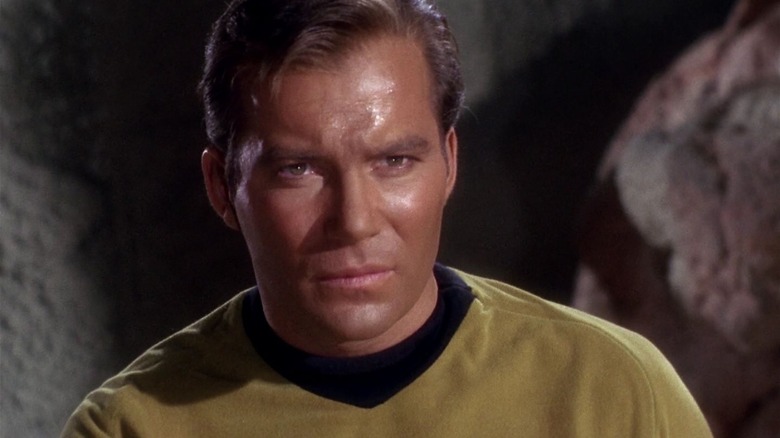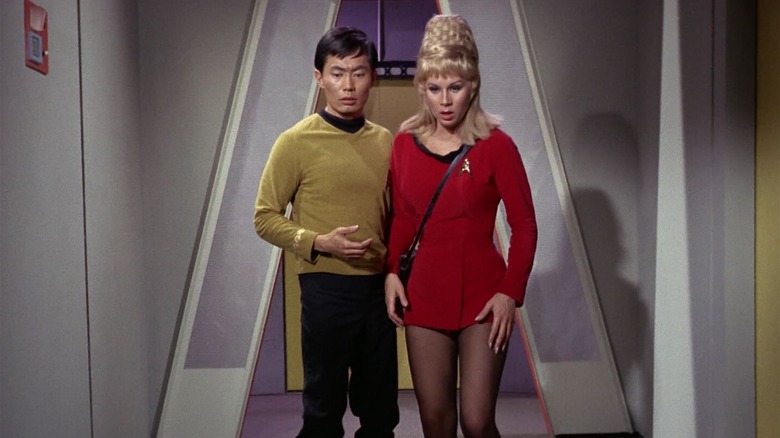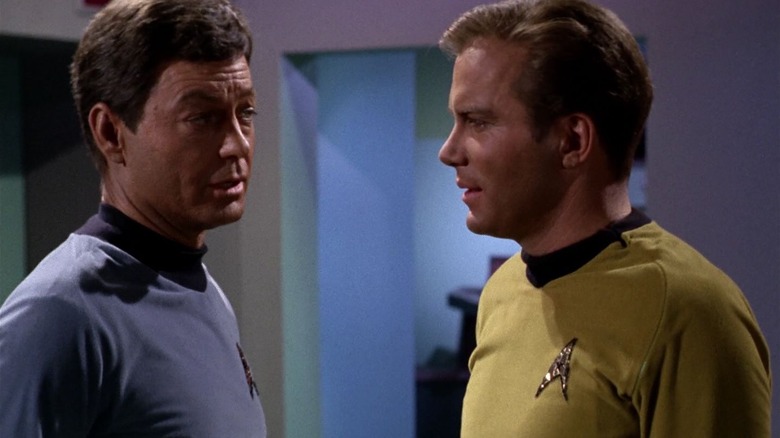Gene Roddenberry's One Big Star Trek Rule Created Problems For The Writers
Trekkies will be able to tell you that "Star Trek" creator Gene Roddenberry was notoriously strict when it came to his famed sci-fi series. Indeed, writers for "Star Trek: The Next Generation" have gone on record saying how much they hated the notorious Roddenberry Rule when it came to story. It seems that Roddenberry was insistent — especially in the "Next Generation" days — that there be no interpersonal conflict between the show's main characters. In Roddenberry's view, a Federation starship was a ruthlessly efficient place, and the crew all got along with professionalism and respect; there was to be no insubordination, no bickering, and no professional resentment. That's an idyllic view of the future, of course, but it was terrible for screenwriters who felt they needed conflict in order to create drama.
But Roddenberry stood fast, holding his rules in place for many years. When he died, executive producer Rick Berman took over the franchise, and he was equally protective of the rules. Eventually, however, the writers won out and interpersonal conflict became more and more common as the shows progressed. These ideas, one might posit, would outrage Roddenberry, who believed in structure and order.
Actor William Shatner, recalling shooting "Star Trek" in 1966, felt that Roddenberry had inserted certain military rules into the show that were being too stringently enforced. In March 2024, Shatner spoke with The Hollywood Reporter about his storied career and stated how Roddenberry was something of a stick in the mud when it came to inter-officer fraternization on the starship Enterprise. Shatner posited that Roddenberry's love of structure and order stemmed from his history in the military and from working as a Los Angeles police officer.
No fraternization on the Enterprise
One of the central relationships on "Star Trek," at least on its first season, was the antagonistic attraction between Captain Kirk (Shatner) and Yeoman Janice Rand (Grace Lee Whitney). The two actors had such interesting chemistry that there were rumors their two characters would date. It seems, however, that some of the show's executives felt Kirk should remain a ladies' man through-and-through. As such, he didn't have relationships with fellow officers — something Roddenberry had dictated.
Shatner was blunter in his comments, saying there's too much "making out" in newer "Star Trek" shows. He knew that Roddenberry didn't like interoffice romance, explaining:
"[Roddenberry] was in the military, and he was a policeman. So there was this militaristic vision of 'You don't make out with a fellow soldier.' There are strict rules and you abide by the rules. Around that, [the writers] had to write the drama. But within that was the discipline of 'This is the way a ship works.' As 'Star Trek' progressed, that ethos has been forgotten. I sometimes laugh and talk about the fact that I think Gene is twirling in his grave. 'No, no, you can't make out with the lady soldier!'"
Gene Roddenberry was part of the United States Army Air Corps in the mid-1940s and flew many flights. After crashing a plane (an incident that took the lives of two of his fellow officers), Roddenberry shifted his focus to investigating crash sites. As a passenger, he survived a second crash. In the late 1940s, Roddenberry had a brief career as a commercial airline pilot and lives through a third crash, this time killing and injuring over a dozen people. One can see why Roddenberry might require order and structure in his military show; people need to be kept safe.
Star Trek writers found Roddenberry's rules 'claustrophobic'
Shatner, it should be noted, wrote and directed a documentary in 2014 called "Chaos on the Bridge," which detailed the behind-the-scenes drama during the first two seasons of "Star Trek: The Next Generation." Shatner found that many executives were vying for control over the project, with certain writers — and one particularly nasty lawyer — deliberately rewriting scripts without anyone's permission. Roddenberry had felt helpless when the "Star Trek" movies were wrested from his direct control (a result of the disappointing box office of "Star Trek: The Motion Picture"), and he was determined to control as much of "Next Generation" as possible.
Hence, Shatner said the following to THR:
"I haven't watched the other 'Star Treks' very much, but what I've seen with glimpses of 'The Next Generation' is yes, the difficulty in the beginning, between management, was all about Gene's rules and obeying or not obeying those rules."
Later, Shatner did hear how the "Next Generation" writers didn't like Roddenberry's rules, saying:
"The fights that went on, to my understanding, were big, because the writers had their difficulties. 'We need some more material.' 'We need to get out of here. It's claustrophobic.'"
Roddenberry's Rules were tying their hands behind their backs. It could be argued, however, that Roddenberry was in the right, as "Star Trek: The Next Generation" was a huge hit that Trekkies still celebrate to this day. Indeed, the new generation of "Star Trek" showrunners have returned to the "Next Generation" era many times for new story ideas. It seems that the limitations helped to make the show great.


